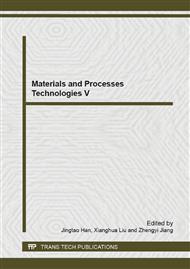p.97
p.102
p.108
p.112
p.116
p.120
p.127
p.132
p.138
Low Temperature Superplasticity of 5083 Aluminum Alloy
Abstract:
5083 aluminum alloy was processed with combined process of warm rolling and annealing. Elongation and tensile strength of samples were measured to analyze the influences of annealing temperature and annealing time on its mechanical properties.Results show that low temperature superplasticity is very sensitive to temperature. The maximum elongation for 5083 aluminum alloy reaches 443% at 250°C and a strain rate of 1×10-3s-1, which means that 5083 aluminum alloy exhibits excellent low temperature superplasticity. Low temperature annealing before drawing could not effectively improve the elongation.
Info:
Periodical:
Pages:
116-119
Citation:
Online since:
June 2014
Authors:
Price:
Сopyright:
© 2014 Trans Tech Publications Ltd. All Rights Reserved
Share:
Citation:


